Alciphron. You must know, Euphranor, I am not at leisure to peruse the learned writings of divines, on a subject which a man may see through with half an eye. To me it is sufficient, that the point itself is odd, and out of the road of nature. For the rest, I leave them to dispute and settle among themselves, where to fix the precise time when the sceptre departed from Judah; or whether in Daniel’s prophecy of the Messiah we should compute by the Chaldean or the Julian year. My only conclusion concerning all such matters is, that I will never trouble myself about them.
Euphranor. To an extraordinary genius, who sees things with half an eye, I know not what to say. But for the rest of mankind, one would think it very rash in them to conclude, without much and exact inquiry, on the unsafe side of a question which concerns their chief interest.
Alc. Mark it well: a true genius in pursuit of truth makes swift advances on the wings of general maxims, while little minds creep and grovel amidst mean particularities. I lay it down for a certain truth, that by the falacious arts of logic and criticism, straining and forcing, palliating, patching, and distinguishing, a man may justify or make out anything; and this remark, with one or two about prejudice, saves me a world of trouble.
George Berkeley, Alciphron, in The Works of George Berkeley, D. D., vol. 2 (Oxford: Clarendon Press, 1901), p. 285.


